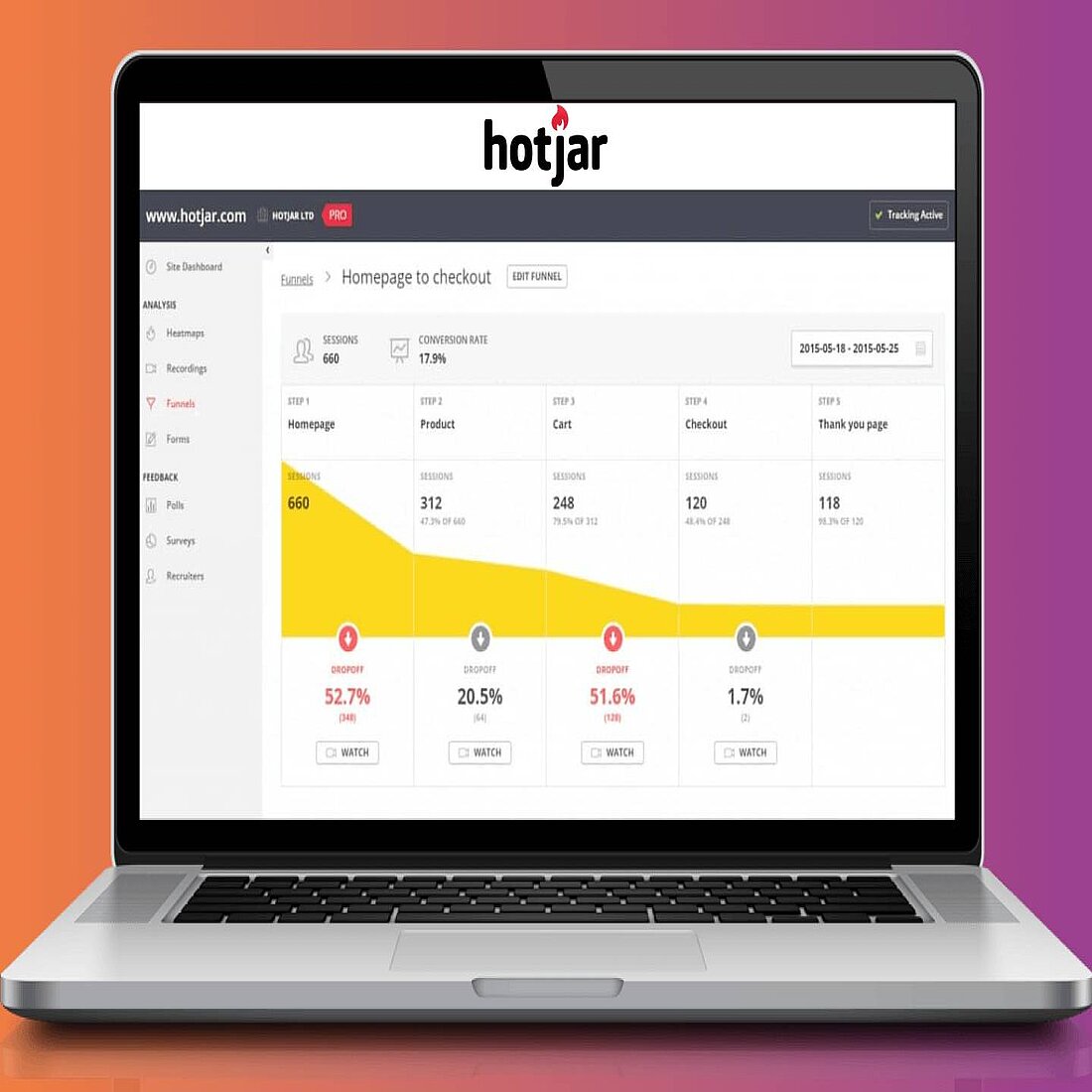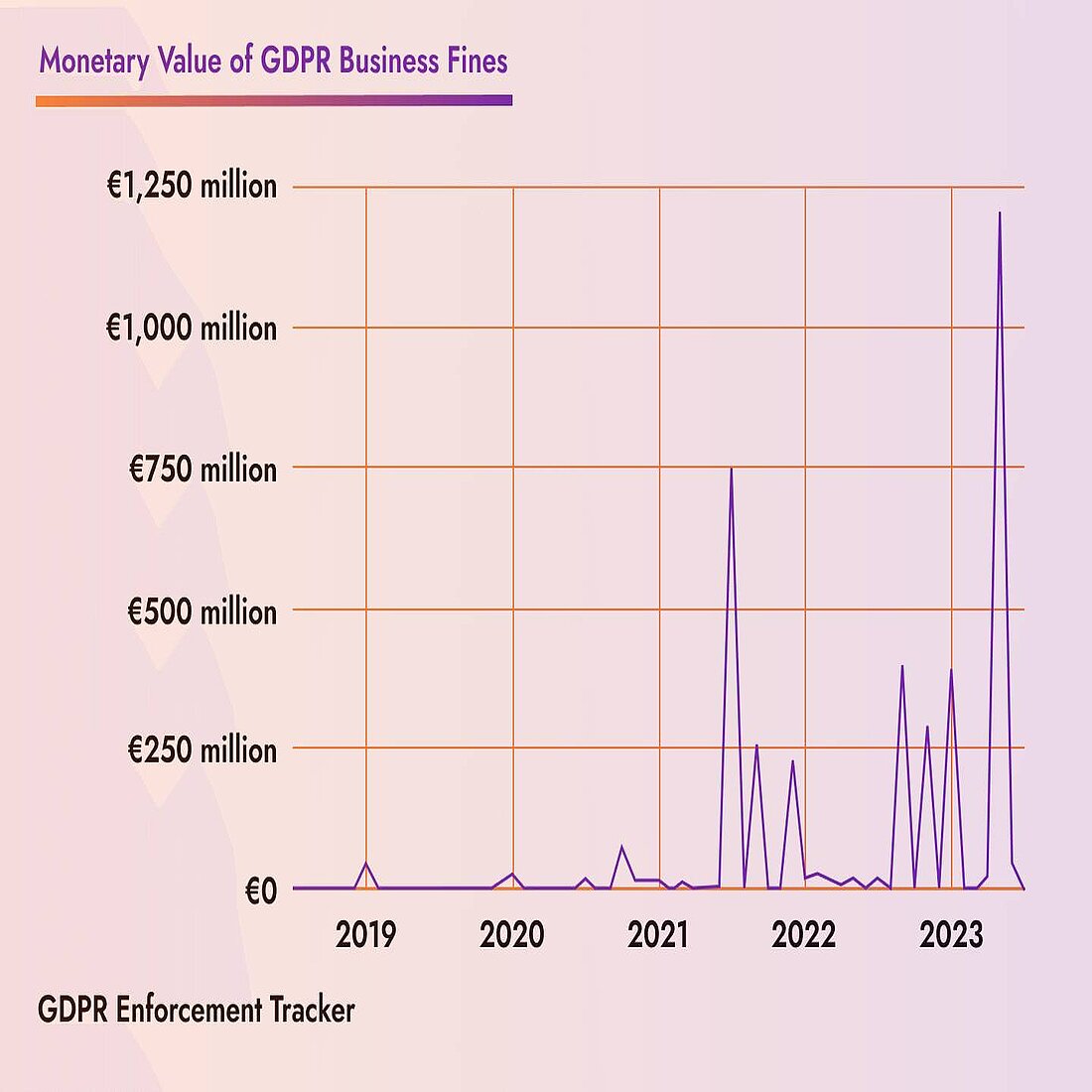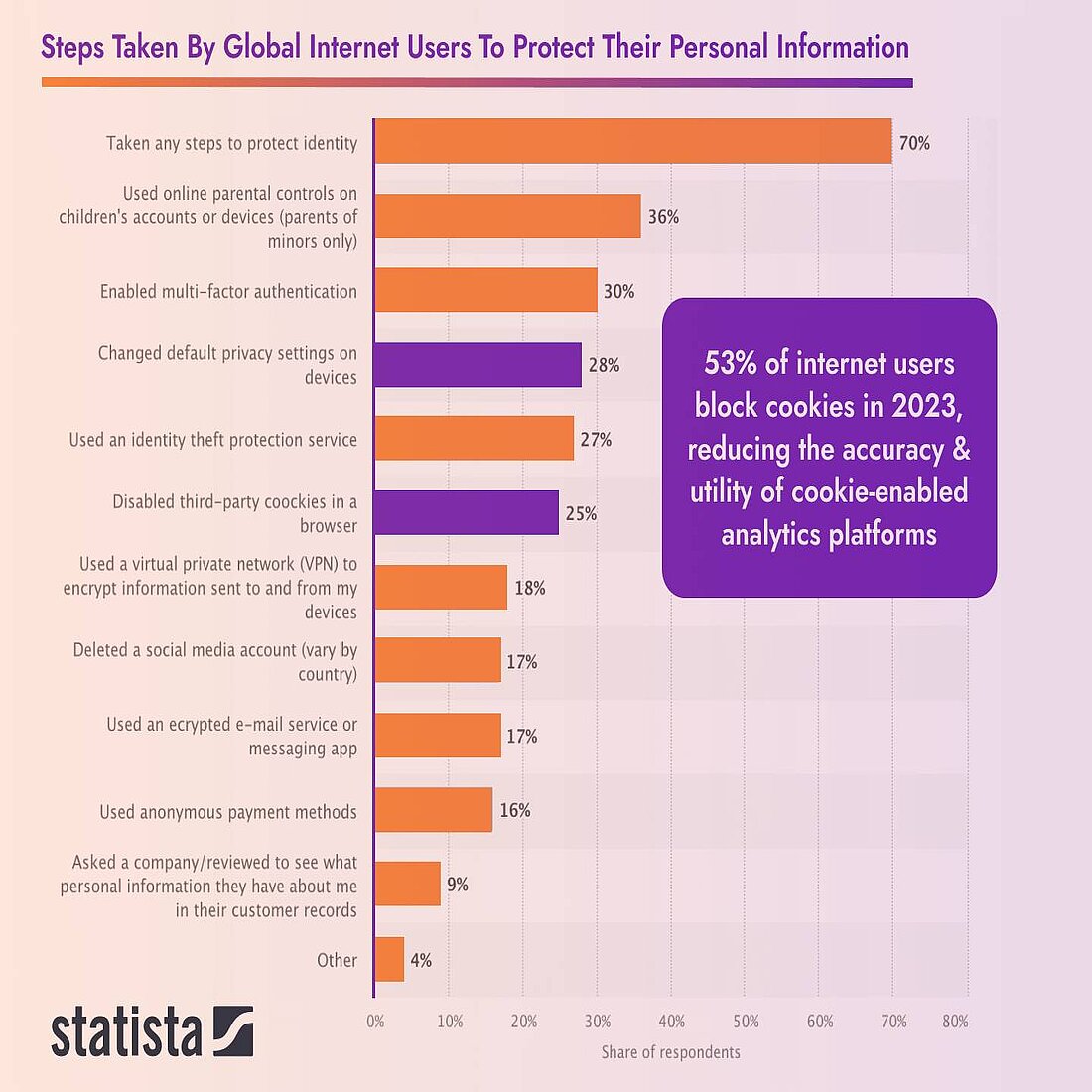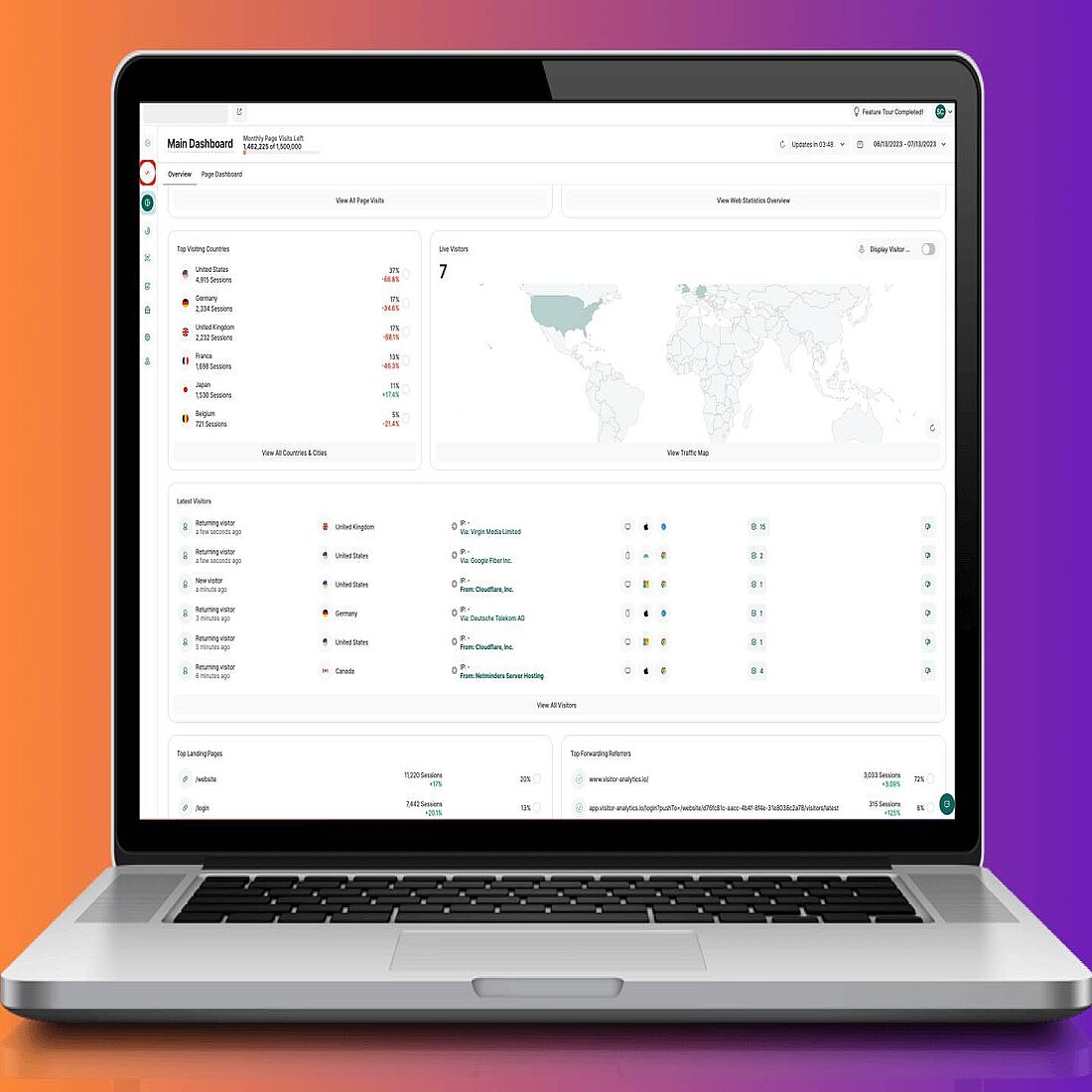
Simon Coulthard July 14, 2023

Hotjar is a go-to website analytics tool for many. But in a digital world increasingly concerned with data privacy, the question arises: Is Hotjar GDPR compliant?
In short, yes! Hotjar has every right to shout from the mountaintops about its GDPR compliant integration.
However, it does use cookies to track users and this gives marketers some responsibilities to answer of their own with regard to data privacy.
But let’s go deeper now!
Answering this question in full requires looking into the EU’s data privacy law so as to see how well Hotjar meets its requirements and takes the burden away from users.
So let’s jump straight in!

Hotjar: An In-depth Overview
Stepping onto the scene with a bang, Hotjar has firmly established itself as a notable player in the website analytics sphere.
Its influence is undeniable, finding its way onto a striking 1.3 million websites around the world. It promises to be a 'one-stop shop' for businesses, equipped with a suite of tools aimed at giving a 360-degree view of user behavior.
So, what's under the hood?
Hotjar's Features
Hotjar comes packed with a slew of features, each aimed at unlocking a different facet of user interaction.
Heatmaps lead the charge, offering a vibrant visual record of clicks, scrolls, and movements, translating user interaction into a digestible format. Then come the session replays - or session recordings as we call them. These enable businesses to watch user journeys around the website in real time, and are a great way to understand a website from the perspective of its customers.
Hotjar’s surveys and interviews add another layer of depth. These feedback tools open up a dialogue with your users, delivering a goldmine of qualitative insights that can be used to hone website development.
Lastly, conversion funnels provide a bird's eye view of user navigation pathways, pinpointing areas of friction and drop-off.
An impressive aspect of Hotjar’s appeal is its dedication to making these advanced tools universally accessible. Users often express their admiration for the smooth and efficient setup process. The process is uncomplicated, and requires no prior technical expertise.
Moreover, Hotjar is compatible with most websites. It also claims to be GDPR-ready, making it appealing to a great many businesses (more on that later).
It’s also fairly user-friendly, with an intuitive insights interface that makes its filtering and collaborative tools easy to navigate. This combination is instrumental in bridging the gap between raw data and authentic user behavior, painting a comprehensive picture of website performance.
Hotjar has also proven its mettle over time. It's not just a flashy newcomer; it's a seasoned veteran, having earned the trust of numerous prestigious companies worldwide. It is these companies' go-to choice for analyzing over a million websites, a testament to Hotjar’s efficacy.
Hotjar User Complaints and User Rating
However, it's not all smooth sailing. While it offers a free entry package, features are limited. The pricing structure of the payment plan jumps up quickly to a hefty €171 per month. Simply put, many people just don't think it's worth the eye-watering price tag.
Users also complain that the session replay tool is frustrating, it’s difficult to pull useful information from the integration, and the level of funnel and form analysis is lower than what they’ve come to expect from other tools.
But despite these minor hiccups, Hotjar retains a respectable 4.3-star rating on G2, speaking volumes about its dependability and functionality.
In summary, despite a few bumps on the road, Hotjar's mix of feature-rich tools, user-friendly approach, and well-earned industry respect make it an enticing proposition for businesses looking to turbocharge the digital experiences they offer.

Importance of the GDPR Compliance of Hotjar
The GDPR, enforced since May 25, 2018, represents a significant evolution in data privacy regulations.
GDPR has real implications for marketers. The law dictates how businesses process and handle the data of EU citizens, making compliance a global concern for businesses processing EU data.
In other words, GDPR is a legal obligation that businesses must adhere to.
GDPR and Analytics Integrations
Website analytics tools - like Hotjar - serve a pivotal role in comprehending user behavior, enhancing website performance, and optimizing marketing strategies.
These tools proficiently amass and process various data types, including IP addresses, cookies, and also browsing patterns.
Nonetheless, the GDPR imposes rigorous requirements concerning the collection and processing of this personal data, encompassing any information capable of directly or indirectly identifying an individual.
In order to ensure strict adherence to GDPR guidelines, website owners and operators must meticulously deliberate over the integration of analytics tools.
It becomes paramount to adopt privacy-centric practices and obtain explicit consent from users prior to collecting any personal data.
Achieving this entails being transparent about the type of data collected, the purpose of this, and the duration of data retention. Moreover, users must retain the freedom to opt out of data collection or withdraw their consent at any given moment.
Furthermore, the GDPR necessitates organizations to implement robust security measures designed to safeguard the personal data they collect and process. This entails encryption of data, regular software updates, and a restricted data access policy exclusive to authorized personnel.
Penalties for Businesses that Don't Meet GDPR Requirements
Failure to comply with the GDPR can potentially result in severe penalties, including substantial fines. Europe's Data Protection Authorities are getting stronger, with GDPR Enforcement Tracker showing that fines are steadily increasing year on year.
Therefore, website owners bear the responsibility of meticulously reviewing their analytics integrations, updating their privacy policies, and ensuring that their data collection practices align impeccably with the GDPR's principles of transparency, accountability, and user consent.
In summary, the GDPR's relevance to website analytics integrations manifests through its steadfast focus on preserving the sanctity of individuals' personal data, while simultaneously enforcing transparency and granting control over its collection and processing.
Adhering to the GDPR's rigorous requirements not only facilitates compliance with the law, but also engenders trust among users, cultivating stronger customer relationships and promoting an ethically sound approach to data management.

Assessing the GDPR Compliance of Hotjar
Hotjar has always had a strong emphasis on data privacy.
The advent of GDPR in 2018 was seen by Hotjar as an opportunity to further strengthen data security measures. The company has responded well, and shows a commitment to processing data securely and respecting data privacy.
Today, Hotjar claims that it’s fully compliant with GDPR, but let’s run through the different aspects of this and see how it fairs.
Hotjar's GDPR Compliance Explained
| 1 | Data Collection | Hotjar, fundamentally, collects user data, ranging from user interactions to device-specific information. The manner in which Hotjar collects, processes, and safeguards this data, is crucial to its compliance with GDPR. |
| 2 | Principles of 'Right of Access' and 'Right of Erasure' | Using the Visitor Lookup feature, users can view and delete their data. Furthermore, automatic suppression can be applied to numeric digits and email addresses in session recordings, heatmaps, and feedback screenshots, thereby protecting personally identifiable information. |
| 3 | Data Portability and Retention | Hotjar complies with GDPR's requirements for data portability and data retention. Users can export data in either CSV or XLSX formats, and Hotjar enforces an automatic 365-day data retention policy to ensure data older than a year is systematically deleted. |
| 4 | User Consent | Hotjar is designed to respect the principle of user consent that lies at the heart of GDPR. When personally identifiable information is shared through a poll or feedback widget, Hotjar seeks user consent and allows for easy withdrawal of such consent. |
| 5 | Cross-border Data Transfer | Hotjar also adheres to GDPR rules pertaining to cross-border data transfers, ensuring that such transfers are secure and compliant with GDPR norms. |
| 6 | Data Storage | User and usage data that Hotjar collects through its software is stored in Ireland, European Union (EU) on the Amazon Web Services infrastructure, eu-west-1 data centers. Its application and data servers also run inside an Amazon Virtual Private Cloud (VPC), though it doesn't specify where this server is located. |
In sum, Hotjar has done an excellent job at building privacy into its platform - something we admire here at TWIPLA.
Where Hotjar Falls Short of GDPR Compliance
However, it’s still important to note that Hotjar does collect the personal data of users. This means that business owners need to ensure that they get explicit, opt-in consent from users for Hotjar’s data processing activities They also need to ensure that visitors are able to easily opt out at any time.
This requires a cookie consent banner, but these pop ups reduce the quality of the user experience that they are able to offer.
Simply put, cookie banners are ugly and are a distraction from the website design and user experience that businesses work so hard to create.
Users also often either reject the non-essential cookies on request that Hotjar needs to collect data, or set their browsers to reject them automatically.
Indeed, data from Statista shows that these actions make over half of all website traffic untrackable. In effect, this reduces the reliability and accuracy of the insights available from analytics integrations like Hotjar significantly.
TWIPLA: A Fully GDPR-compliant Alternative to Hotjar
Hotjar has made significant strides towards GDPR compliance. But businesses looking for a fully GDPR-compliant solution might want to consider TWIPLA.
We’re currently installed on over 2.5 million websites, and have a strong 4.7 rating on Capterra.
TWIPLA has been designed with privacy in mind. However, it goes further than Hotjar by rejecting personal user data collection completely.
TWIPLA's Cookieless Tracking Solution
Instead, it uses advanced cookieless fingerprinting technology that fully anonymizes user data. Nor does it track IP addresses that are categorized as personal data under GDPR.
Simply put, this model is the most accurate way to track 100% of website visitors. It enables businesses to get the insights they need for website optimization without having to obtain user consent for data collection.
This makes many of the time consuming data management practices required by Hotjar users obsolete, and removes the need for cookie consent banners altogether.
Crucially, TWIPLA offers a complete website intelligence solution. It includes all of the features offered by Hotjar: website statistics, visitor behavior analytics, and visitor communication tools.
Unlock Your Website's True Potential
Our privacy-first website intelligence solution will enable anyone to grow their website quickly and optimize the customer experience - all while keeping user data safe!

That's Hotjar's GDPR Compliance Explained!
As data analytics become increasingly critical for businesses, compliance with data privacy laws such as GDPR becomes ever-more of a non-negotiable.
Hotjar can rightly be proud of the efforts they’ve made aligning their integration with GDPR requirements, but they have still left businesses with work to do. Given this, website owners seeking a fully GDPR-compliant solution may find TWIPLA to be a better choice.
In the end, the choice of tool can greatly impact both a business's performance and the level of trust it can build with its users in a world increasingly conscious of data privacy.
Frequently Asked Questions
Is Hotjar in line with GDPR regulations?
Indeed, it is. Hotjar has taken conscious steps to ensure that its platform is designed with data privacy at its core. Users can have peace of mind knowing that Hotjar has been structured to ensure secure data processing and compliance with GDPR guidelines.
However, it does use tracking cookies. This gives website owners responsibilities of their own if they're to collect user data in a way that confirms with GDPR. If you want to use a website analytics platform that stays away from tracking cookies, why not sign up for free to TWIPLA?
Can you shed some light on GDPR and its significance?
GDPR, or the General Data Protection Regulation, is a pivotal legislation implemented by the European Union back in May 2018, and you can read more about it in our Resource Hub on GDPR and Data Privacy. Its main purpose? To safeguard the privacy rights of its citizens by reinforcing the careful handling and processing of personal data. For businesses, it underscores the importance of handling customer data responsibly.
How does Hotjar conform to GDPR's provisions?
Hotjar’s commitment to GDPR is evident in their privacy-centric approach to data. They've rolled out features like Visitor Lookup, offering users the right to access and delete their data. They also practice automatic suppression of Personally Identifiable Information (PII) in their suite of tools. To top it off, they ensure data portability and enforce data retention periods.
Do I need a privacy policy if I use Hotjar on my website or app?
Yes, you do. If you're using Hotjar, or any other third-party service that collects and processes user data, it's critical to have a Privacy Policy on your website or app. This policy should detail how you collect, use, and handle user data. It's not only a requirement of GDPR but also a part of being transparent with your users about their privacy.
Do I need a Cookie Banner if I use Hotjar on my website or app?
Hotjar does use cookies for its services, so if your website or app uses Hotjar and targets users in the European Union or areas where consent for cookies is required by law, then yes, you will need a Cookie Banner. This banner should inform visitors that your site uses cookies, what these cookies do, and ask for their consent to use them. However, different regions have different requirements for cookie consent. As such, it's always best to consult with a legal professional to ensure compliance.
Are there any GDPR-compliant alternatives to Hotjar?
Certainly! TWIPLA is one noteworthy example. It's not only fully compliant with GDPR, but also aligns with all global data privacy laws. Its unique selling point? Advanced cookieless tracking technology that ensures data anonymity. Plus, it doesn't require cookie consent banners and provides robust website analytics functionalities.
Share article
Get Started for Free
Gain World-Class Insights & Offer Innovative Privacy & Security


Stay Updated & Get Inbox Insights
Keep pace with the world of privacy-first analytics with a monthly round-up of news, advices and updates!










